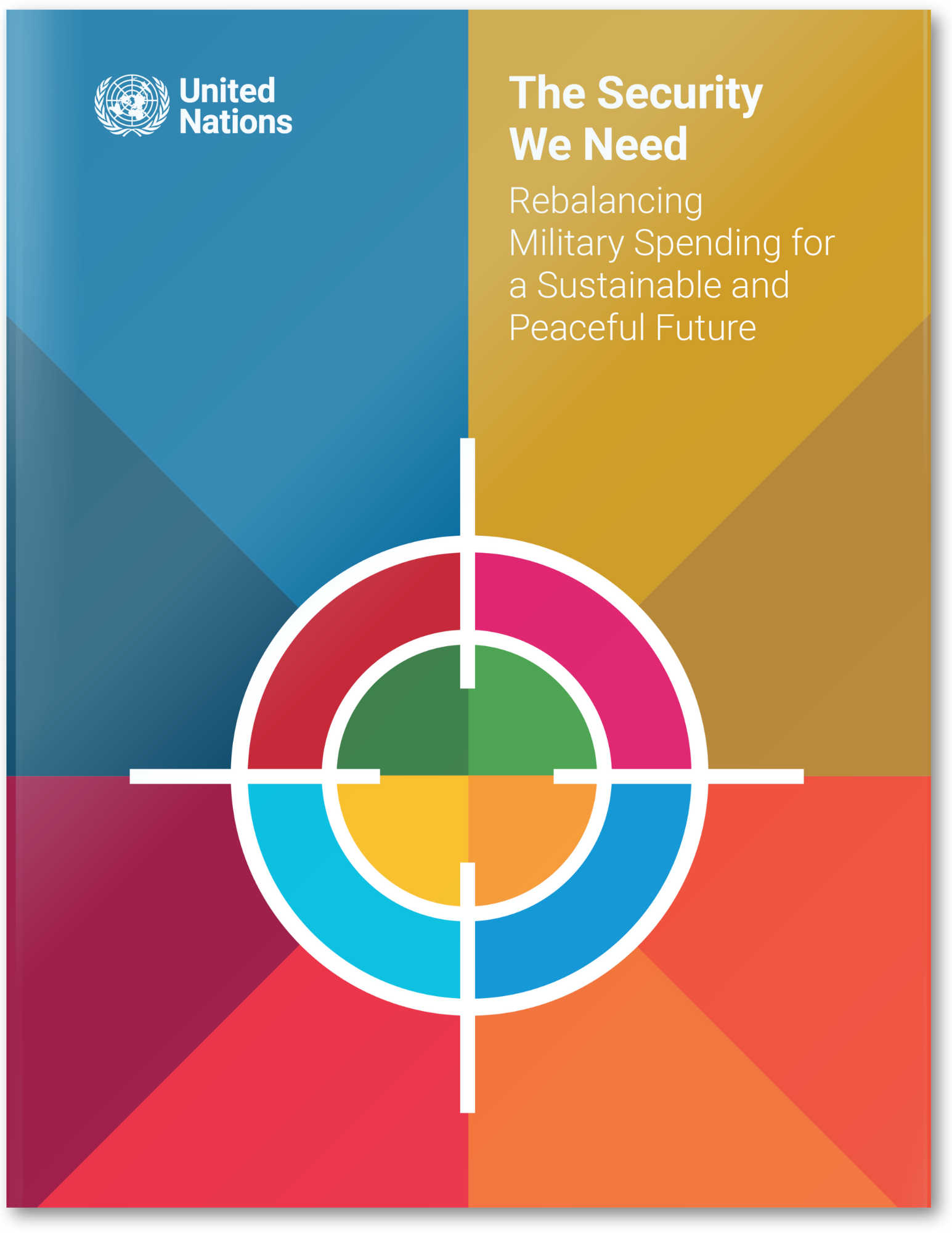
The Security We Need
Rebalancing Military Spending for
a Sustainable and Peaceful Future
At this critical moment, the international community must confront the stark reality that rising military expenditures are not yielding greater peace but are instead undermining our shared vision for a sustainable future."
ANTÓNIO GUTERRES, United Nations Secretary-General
Background
We … request the Secretary-General to provide analysis on the impact of the global increase in military expenditure on the achievement of the Sustainable Development Goals by the end of the seventy-ninth session."
Action Item 13c, Pact for the Future (September 2024)
In 2024, global military spending reached an all-time high of $2.7 trillion, marking the tenth consecutive year of growth. While global security has continued to deteriorate despite this rising investment, this upward trajectory has also coincided with a dramatic lag in progress toward the achievement of the Sustainable Development Goals and a marked deterioration in the environment.
Voicing their concern with these trends in the Pact for the Future, in action item 13 Member States requested that I conduct an analysis of the impact of the global increase in military expenditures on the achievement of the SDGs by the end of the 79th session. This study is in response to that request.
Guided by the UN Charter, including article 26, and as part of efforts to promote international peace and security and sustainable development, the study seeks to illustrate the trade-offs and opportunity costs embedded in current patterns of global military spending, and offer proposals for a more balanced approach to military spending and development that could benefit individual countries and the planet as a whole.
The study concludes with recommendations to reframe the global approach to security based not on arms races but a race towards a sustainable future for humanity underpinned by diplomacy, cooperation and improved security governance with sustainable peace and development for all at its core.
$2.7 tn
annual global military spending in 2024
$4 tn
financing for development gap
up to $6.6 tn
annual global military spending by 2035
7.1%
real-term decline in official development assistance in 2024
Call to Action
Looking towards the United Nations' centennial, we must urgently recalibrate global security and development strategies to ensure lasting peace and security for current and future generations. Guided by the direction set by Member States in the Pact for the Future, the international community must consider the following measures:
1. Prioritize diplomacy, peaceful settlement of disputes, and confidence-building measures to address the underlying causes of growing military expenditure through 2030.
- As emphasized in my New Agenda for Peace, trust, solidarity and universality constitute the foundation for friendly relations and cooperation among nations and within societies. Restoring these principles is essential to curbing the growth of military expenditure.
- Member States should actively expand regional and global confidence-building measures, promoting transparency and dialogue as essential tools for conflict prevention and peacebuilding. Strengthening international cooperation through revitalized diplomatic and preventive frameworks is crucial. Sustained investments in diplomatic channels and conflict resolution mechanisms must become the cornerstone of collective security.
- To disrupt the perceived inevitability of escalating global military spending, Member States are encouraged to initiate an annual General Assembly debate dedicated specifically to reviewing the state of global military expenditure and progress on the Sustainable Development Goals until 2030.
2. Bring military expenditure to the fore of disarmament discussions, and improve linkages between arms control and development
- Key intergovernmental bodies such as the United Nations Disarmament Commission and others should focus some discussions on military expenditure and the links between disarmament and development.
- Member States are urged to integrate disarmament and arms control considerations within broader sustainable development frameworks, particularly the post-2030 agenda.
3. Promote transparency and accountability around military expenditure to build trust and confidence among Member States and increase domestic fiscal accountability.
- Promote regional confidence-building measures, such as the sharing of military expenditure information,to enhance transparency, reduce tensions and miscalculations, encourage restraint and decelerate military build-ups.
- Encourage States to adopt public expenditure and financial accountability standards in the defence sector, including internal and external audits and parliamentary oversight.
- Promote a shift towards more accountable private sector behaviour, including in the arms industry, to support sustainable development and civil society participation in military budgeting. This would help to create a virtuous cycle of accountability that generates public confidence and opens opportunities to redirect savings to sustainable development priorities.
4. Reinvigorate multilateral finance for development
- Build on momentum generated by the Fourth International Conference on Financing for Development to ramp up resources for the 2030 Agenda and beyond.
- Ensure that sources of finance address sustainable development and peace. This requires concrete steps to expand fiscal space, address the debt challenges of developing countries and reduce the cost of capital.
- Along with strong commitment to multilateralism, international cooperation and global solidarity, collective action must prioritize enhancing domestic revenue mobilization while strengthening fiscal systems for long-term resilience. This should include progressive tax reforms, where applicable, alongside intensified efforts to combat tax evasion, illicit financial flows and corruption – particularly by
high-net-worth individuals and transnational corporations– to ensure fair and effective taxation. The end objective is to collect and spend necessary resources transparently and efficiently, in close alignment with sustainable development. - Renew commitment to international cooperation in the face of declining official development assistance. Official development assistance is essential for low-income and developing countries, closing funding gaps in education, health, renewable energy and infrastructure. It could free domestic resources for recipients to both confront security challenges and pursue sustainable development.
5. Advance a human-centered approach to security and sustainable development
- Recognizing that sustainable development is the first line of defence against conflict, it is crucial to balance necessary military spending with sustained investments in people and the planet. Member States should be guided by a human-centred, multidimensional security framework. The Sustainable Development Goals offer a path forward.
- Lasting peace and sustainable development depend not only on the resolve of States but also on the informed participation of civil society. Under the principles of trust, solidarity and universality, citizen and civil society participation is essential for ensuring that scarce public resources are allocated in ways that advance human dignity, social justice and the 2030 Agenda, for current and future generations.
Submission to the Secretary-General’s Call for Papers
To support the analysis, the Office for Disarmament Affairs published a Call for Papers with the aim of encouraging engagement and reflection of different stakeholders on the issue. A total of 57 contributions were received from Member States, academia, civil society and other stakeholders.
The papers and reflections were considered in the Secretary-General’s analysis.
Read all papers and reflections from member states, academia, civil society and other stakeholders here.
Additional information
- The Pact for the Future (https://www.un.org/en/summit-of-the-future/pact-for-the-future)
- United Nations Charter (https://www.un.org/en/about-us/un-charter/full-text)
- United Nations Military Expenditure Database (https://milex-reporting.unoda.org/en/states)
- United Nations, 2025: The Sustainable Development Goals Report 2025 (https://unstats.un.org/sdgs/report/2025/The-Sustainable-Development-Goals-Report-2025.pdf)
- Stockholm International Peace Research Institute (SIPRI), 2024: Trends in World Military Expenditure (https://www.sipri.org/publications/2025/sipri-fact-sheets/trends-world-military-expenditure-2024)
